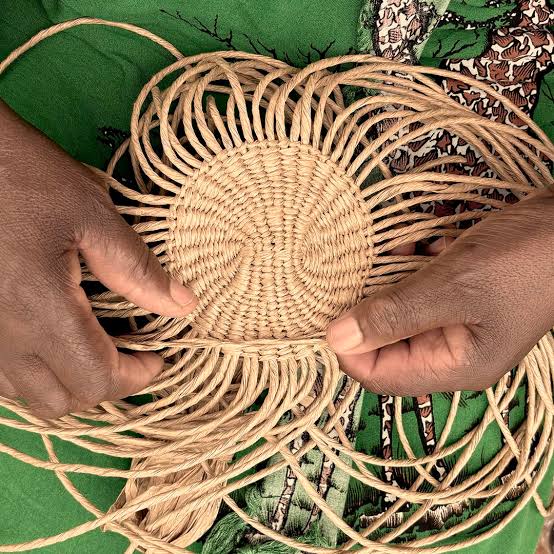The morning sun filtered through the thatched roof of Akello’s small home in Soroti, casting golden streaks across the woven mats where she sat, her nimble fingers coaxing strands of palm leaves into a basket. At 19, Akello had inherited this craft from her mother, a skill that once hummed through Teso villages, baskets cradling harvests and secrets alike. But that day, the air felt heavy with change. A neighbor mentioned a new supermarket opening nearby, its plastic bags piling high, outshining the handwoven wares at the market. Akello’s heart sank. The craft that fed her family, that told stories of resilience, was fading, replaced by convenience and cheap imports.She paused, her hands stilling on the half-finished basket, its pattern a map of her heritage. Her mother had taught her the rhythms—tight weaves for strength, loose ones for breath—while recounting tales of women bartering baskets for grain during lean times. Now, buyers turned away, preferring mass-produced goods. That evening, Akello sat with her younger sister, Amina, under the acacia tree, the silence broken only by crickets. “We can’t let it die,” she said, her voice firm. Amina nodded, her eyes bright with curiosity. Inspired, Akello grabbed her phone and posted: “@TesoCrafter: Basket weaving fading in Soroti. Plastic wins. Help us save our craft! #ReviveWeaving” (180 likes, 35 retweets). @UgandaArtisan: “This needs saving!”—a thread of hope in the digital wind.
The next day, Akello walked to the market, her basket slung over her shoulder, its intricate design a silent plea. Vendors shrugged, pointing to plastic sacks stacked nearby. Undeterred, she gathered a small group—elder women with gnarled hands, young girls eager to learn—and taught them under the tree, her voice weaving instructions with stories. “Each strand holds our past,” she said. She tweeted: “@TesoCrafter: Teaching basket weaving today. Keeping our hands busy, our stories alive. #WeaveLegacy” (230 likes, 50 retweets). @RuralHands: “Love this revival!” The group grew, their laughter mixing with the rustle of leaves.Word traveled beyond Soroti. A tourist from Entebbe, charmed by her basket at a roadside stall, shared a photo online: “@TravelUganda: Stunning basket from a girl in Soroti. Support local crafts! #UgandaCrafts” (300 likes, 70 retweets). Orders trickled in, from Kampala cafes to overseas buyers. Akello trained Amina and two others, their fingers learning the dance of the weave. She posted: “@TesoCrafter: New orders for our baskets! Teaching my sister and friends. #CraftRise” (280 likes, 60 retweets). @KlaMarket: “Can’t wait to stock these!” Hope bloomed, but the supermarket’s shadow loomed larger.
Challenges emerged. A local trader mocked her efforts, saying, “Plastic is faster.” Her hands blistered from long hours, and materials grew scarce as palm groves were cleared for farms. One night, a storm damaged her drying leaves, leaving her supplies soggy. Akello sat among the ruins, tears mixing with rain, but Amina’s voice broke through. “We’ll start again.” She tweeted: “@TesoCrafter: Storm hit our materials, but we won’t stop. Need help! #WeaveOn” (320 likes, 75 retweets). @EcoUganda: “Sending support!” Donations of leaves and tools arrived, a lifeline from strangers.
With renewed vigor, Akello expanded her reach. She partnered with a cooperative, selling baskets at fairs, their designs blending Teso patterns with modern flair—reds for courage, greens for growth. She shared: “@TesoCrafter: Joined a coop! Our baskets at a fair tomorrow. #TesoPride” (350 likes, 80 retweets). @CraftLovers: “Stunning work!” The fair drew crowds, but a buyer warned of cheap imports flooding the market, threatening their gains. One afternoon, an elder, Okori, visited, his basket-woven hat a relic of the past. “Teach the children,” he urged. Akello started workshops, kids’ small hands mimicking hers, their giggles a new rhythm. She posted: “@TesoCrafter: Kids weaving today! Passing the craft to the next generation. #FutureWeavers” (400 likes, 90 retweets). @SorotiYouth: “This is our future!” Yet, funding waned, and a rival trader undercut prices, forcing Akello to adapt with online sales. The struggle persisted.
One evening, a large order from a Kampala hotel boosted her spirits, but she knew the craft’s survival hung by a thread. She sat with Amina, weaving under lantern light, their hands a duet. She tweeted: “@TesoCrafter: Big order today, but our craft needs more love. When will Uganda value us? #SaveHandmade” (300 likes, 65 retweets). @ArtSupport: “We’re with you!”—a call to endure. The baskets stood, fragile yet enduring, a mirror to Uganda’s cultural fight. Akello knew plastic’s tide might rise again, but with each weave, each post, she stitched a future for this forgotten trade—for Amina, for Teso’s soul.
This post was created with our nice and easy submission form. Create your post!





